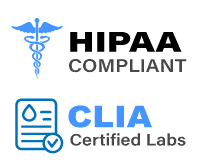Free Consultation
(62365) 2245 2781
Contact us for assistance via phone or live chat.
(62365) 2245 2781
$10 discount at checkout.
Chlamydia and Gonorrhea are among the most prevalent common sexually transmitted diseases (STDs) worldwide. Bacteria cause both and are typically transmitted through sexual contact (vaginal, anal, or oral).
Because these infections often occur without symptoms, regular STD testing is critical for sexually active individuals, particularly those with multiple partners or engaging in unprotected sex.
At an Atlanta STD Testing Lab or any other facility, Chlamydia and Gonorrhea testing requires only a urine sample.
Chlamydia trachomatis is the bacterium responsible for causing Chlamydia. In many cases, individuals infected with this bacterium exhibit no symptoms, which makes regular testing crucial. The Chlamydia test at an Atlanta STD Testing Lab usually involves one of two testing methods:
Gonorrhea, contacted by the bacterium Neisseria gonorrhoeae, is another prevalent STD that often shows no symptoms, particularly in women. The Gonorrhea test at an Atlanta STD Testing Lab usually involves:
Both tests can often be done using the same sample, which makes concurrent Chlamydia and Gonorrhea testing routine in many clinics and laboratories.
Turnaround time for results varies but is typically a few days to a week. Individuals are contacted immediately to discuss treatment options if a positive test results.
In the Atlanta STD Testing Lab, as in many testing centers, patient confidentiality is paramount. Therefore, all tests and results are handled in strict confidence, with results communicated directly and discreetly to the individual.
Prompt treatment for both Chlamydia and Gonorrhea is critical. If these STDs are left untreated, these infections can yield serious health problems, including (PID)pelvic inflammatory condition in women, which can lead to infertility, and epididymitis in men, which can also lead to infertility.
Regular STD testing is essential for maintaining sexual health and well-being. Atlanta STD Testing Labs provide safe, confidential, and accurate services for detecting Chlamydia and Gonorrhea, among other STDs. However, it is always recommended to consult a healthcare provider to decide the most appropriate testing and treatment options for your situation.


We use the lab test known as Nucleic Acid Amplification (NAA), which has been FDA-approved.
It looks for the bacteria that cause gonorrhea and chlamydia infections: Neisseria gonorrhoeae and Chlamydia trachomatis.
There is no need for uncomfortable swabbing or undressing for the most accurate Chlamydia and Gonorrhea test; the only required is a small urine sample.
All laboratory tests, including STD testing, have sensitivity and specificity that are used to evaluate their accuracy rates. For example, our test panel has 99.8% sensitivity and 99.3% specificity for chlamydia and gonorrhea.
An hour earlier, No urinating is recommended. Before arriving at the testing location, have enough urine samples.
Bacteria cause sexually transmitted diseases (STDs), Chlamydia, and gonorrhea. For example, over 3 million new cases of Chlamydia are contracted annually in the United States due to the Chlamydia trachomatis bacteria.
Neisseria gonorrhoeae is a bacterium that flourishes in the moist regions of the reproductive tract, such as the cervix, Fallopian tubes, uterus in females, and the urethra in both men and women, causing gonorrhea. Additionally, gonorrhea can appear in the mouth, throat, antrum, or eyes.
Based on (CDC) analysis, over 700,000 cases of gonorrhea are reported each year in the US. Both illnesses are often described as “silent” or “asymptomatic,” meaning they don’t necessarily result in symptoms.
Take an STD test to determine if you have one of these sexually transmitted diseases. In addition, antibiotics can be utilized to treat Chlamydia and gonorrhea.
Our lab offers the FDA-cleared Nucleic Acid Amplification (NAA) test, the industry-recognized gold standard for chlamydia and gonorrhea testing. Our NAA test scans a little urine sample for signs of infection.
Humans are susceptible to chlamydia and gonorrhea infections, which are spread through oral, vaginal, and anal intercourse.
Whether or not ejaculation takes place, both illnesses are still conceivable. In addition, it is possible to re-infect yourself with chlamydia or gonorrhea after receiving treatment for these STDs if you have sex with an infected partner or if the bacteria was not eliminated from your body before having sex again.
The most typical signs of the infections, though not always present, are burning when urinating, strange discharge, or atypical blisters or rashes in the genital region. According to the CDC, gonorrhea and chlamydia screenings should be performed on all sexually active women under 25.
Both men and women can contract the sexually transmitted illnesses of gonorrhea and chlamydia. You should routinely be tested for both diseases if you have sexual contact. Multiple sexual partners are dangerous behavior. Both of these illnesses are asymptomatic; thus, catching and spreading them unwittingly is easy. Getting tested is the only surefire method to determine if you are positive.
Testing for both STDs is crucial since co-existing diseases, such as chlamydia and gonorrhea, are sometimes contracted simultaneously by the same person. Small urine samples are used to identify these disorders brought on by bacteria.
Even though they are relatively simple to treat and cure with antibiotics, untreated chlamydia, and gonorrhea infections have considerable consequences in showing significant side effects, such as epididymitis, a painful condition in men’s testicular tubes, and pelvic inflammatory disease (PID) in women, which can result in infertility and ectopic pregnancy.
For accurate results, our experts advise waiting 1–5 days after a possible chlamydia exposure and 2–6 days after a potential gonorrhea exposure before getting tested. To ensure the virus has been removed and won’t be spread to your partners, it is also advisable to be retested 21 to 28 days after treatment.
Hold off urinating for at least an hour to ensure having a urine sample when you arrive at our testing facility. No additional preparation or fasting is required.